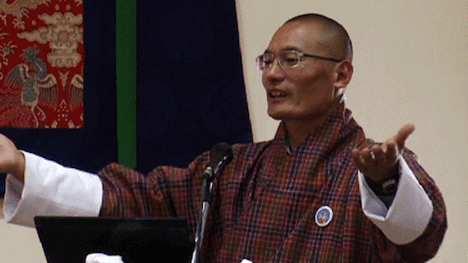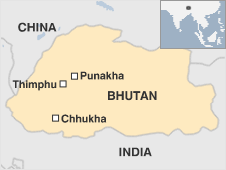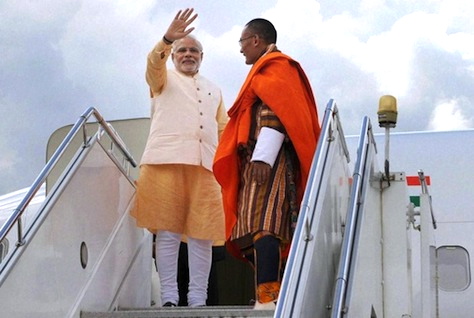
Although it’s only the second election in the brief history of Bhutanese democracy, Bhutan’s voters will mark the precedent of its first democratic transfer of power following Saturday’s election, in which the opposition People’s Democratic Party (PDP, མི་སེར་དམངས་གཙོའི་ཚོགས་པ་) scored a major victory, winning 32 seats to just 15 seats for the governing party.
That’s quite a turnaround from the country’s first-ever election in 2008, when the governing Bhutan Peace and Prosperity Party (Druk Phuensum Tshogpa, DPT, འབྲུག་ཕུན་སུམ་ཚོགས་པ) won 45 out of 47 seats in the country’s Gyelyong Tshogdu (National Assembly), the lower house of the recently promulgated Bhutanese parliament.
The governing DPT is seen as slightly closer to Bhutan’s monarch, the Druk Gyalpo (འབྲུག་རྒྱལ་པོ, its ‘dragon king’), the young Jigme Khesar Namgyel Wangchuck who has, like his father before him, smoothed the path toward the gradual development of a constitutional monarchy. But both parties support the constitutional monarchy and both parties have ties to the governing elite. The former PDP leader, for example, is Sangay Ngedup, who previously served as prime minister in the pre-parliamentary era from 1999 to 2000 and from 2005 to 2006. DPT leader and Bhutan’s first elected prime minister, Jigme Thinley, previously served as prime minister from 1998 to 1999 and from 2007 to 2008.
Here’s more background on Bhutan’s idiosyncratic path to democracy at the time of the first round at the end of May, which eliminated two of the four competing political parties, setting the conditions for the July runoff between the DPT and the PDP. Although the governing DPT won 44.52% of the first-round vote to just 32.53% for the opposition PDP, the DPT picked up virtually no support in the weeks following its initial May victory.
Tshering Tobgay (pictured above), the PDP’s current leader, will now become Bhutan’s second prime minister, is a former civil servant, and comes from a younger generation of Bhutanese than either Ngedup or Thinley. (You can watch his TEDx talk in English on happiness here). He’ll come to power on a wave of discontent over many issues, including a rupee shortage last year that brought about a miniature credit crunch in Bhutan caused, in part, by the government’s decision to spend too much of its Indian rupee reserves.
But the outcome may owe much to India’s ham-fisted decision to terminate a kerosene and cooking gas subsidy to its northern neighbor at the end of June, causing prices of the two energy sources to rise, allegedly in retribution for Thinley’s diplomatic overtures to the People’s Republic of China. In the immediate aftermath of Saturday’s election, Indian prime minister Manmohan Singh made it clear that the subsidy would be restored as soon as possible. But the clear implication is that India used its special influence with Bhutan, the top recipient of Indian financial aid, to attempt to intervene in an internal election:
New Delhi was alarmed not just by Thinley, who made himself the official ambassador of Bhutan’s Gross National Happiness phenomenon, reaching out to Beijing but also the manner in which he established diplomatic ties with many other countries without bothering to take South Block into confidence.
Tobgay used the crisis as yet another instance to criticize Thinley for jeopardizing Bhutanese-Indian relations and he’s stated that bilateral relations with India will be his top priority. Though Indian officials now admit the subsidy decision could have been better timed, it’s hard to see how the subsidy dispute could have helped Thinley in the closing days of the Bhutanese campaign. Given the central economic and geopolitical role that India plays in Bhutan, it wasn’t a good sign for Thinley that he spent the final week of the campaign on the defensive over Indian relations. There are a lot of reasons for the PDP’s victory on Saturday, including the wholly separate issue of last year’s rupee shortage, wider doubts about the Bhutanese economy, youth unemployment and the still-unsettled treatment of the Nepalese minority in Bhutan. But it’s not hard to see how the PDP’s success — in southern Bhutan, in particular — came about in large part due to the Indian issue.
To understand why India (and China) are so important to Bhutan is to understand the simple geography of the country:

Continue reading Do Chinese-Indian relations explain the result of the Bhutanese elections? →
![]()


